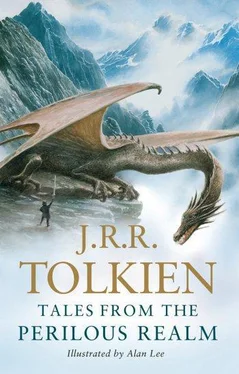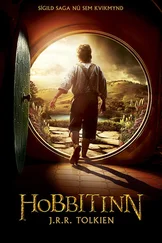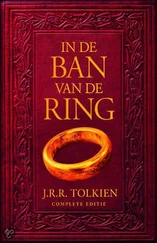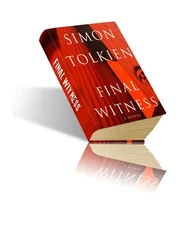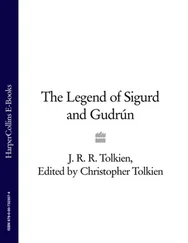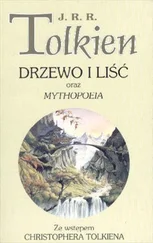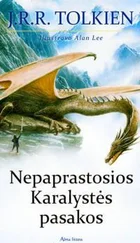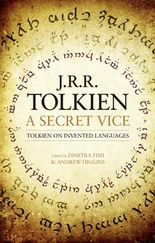"This way!" he said, and led Niggle to a bay, in which there was a very pleasant little local train standing: one coach, and a small engine, both very bright, clean, and newly painted. It looked as if this was their first run. Even the track that lay in front of the engine looked new: the rails shone, the chairs were painted green, and the sleepers gave off a delicious smell of fresh tar in the warm sunshine. The coach was empty.
"Where does this train go, Porter?" asked Niggle.
"I don't think they have fixed its name yet," said the Porter. "But you'll find it all right." He shut the door.
The train moved off at once. Niggle lay back in his seat. The little engine puffed along in a deep cutting with high green banks, roofed with blue sky. It did not seem very long before the engine gave a whistle, the brakes were put on, and the train stopped. There was no station, and no signboard, only a flight of steps up the green embankment. At the top of the steps there was a wicket-gate in a trim hedge. By the gate stood his bicycle; at least, it looked like his, and there was a yellow label tied to the bars with niggle written on it in large black letters.
Niggle pushed open the gate, jumped on the bicycle, and went bowling downhill in the spring sunshine. Before long he found that the path on which he had started had disappeared, and the bicycle was rolling along over a marvellous turf. It was green and close; and yet he could see every blade distinctly. He seemed to remember having seen or dreamed of that sweep of grass somewhere or other. The curves of the land were familiar somehow. Yes: the ground was becoming level, as it should, and now, of course, it was beginning to rise again. A great green shadow came between him and the sun. Niggle looked up, and fell off his bicycle.
Before him stood the Tree, his Tree, finished. If you could say that of a Tree that was alive, its leaves opening, its branches growing and bending in the wind that Niggle had so often felt or guessed, and had so often failed to catch. He gazed at the Tree, and slowly he lifted his arms and opened them wide.
"It's a gift!" he said. He was referring to his art, and also to the result; but he was using the word quite literally.
He went on looking at the Tree. All the leaves he had ever laboured at were there, as he had imagined them rather than as he had made them; and there were others that had only budded in his mind, and many that might have budded, if only. he had had time. Nothing was written on them, they were just exquisite leaves, yet they were dated as clear as a calendar. Some of the most beautiful – and the most characteristic, the most perfect examples of the Niggle style – were seen to have been produced in collaboration with Mr. Parish: there was no other way of putting it.
The birds were building in the Tree. Astonishing birds: how they sang! They were mating, hatching, growing wings, and flying away singing into the Forest, even while he looked at them. For now he saw that the Forest was there too, opening out on either side, and marching away into the distance. The Mountains were glimmering far away.
After a time Niggle turned towards the Forest. Not because he was tired of the Tree, but he seemed to have got it all clear in his mind now, and was aware of it, and of its growth, even when he was not looking at it. As he walked away, he discovered an odd thing: the Forest, of course, was a distant Forest, yet he could approach it, even enter it, without its losing that particular charm. He had never before been able to walk into the distance without turning it into mere surroundings. It really added a considerable attraction to walking in the country, because, as you walked, new distances opened out; so that you now had doubled, treble, and quadruple distances, doubly, trebly, and quadruply enchanting. You could go on and on, and have a whole country in a garden, or in a picture (if you preferred to call it that). You could go on and on, but not perhaps for ever. There were the Mountains in the background. They did get nearer, very slowly. They did not seem to belong to the picture, or only as a link to something else, a glimpse through the trees of something different, a further stage: another picture.
Niggle walked about, but he was not merely pottering. He was looking round carefully. The Tree was finished, though not finished with – "Just the other way about to what it used to be," he thought – but in the Forest there were a number of inconclusive regions, that still needed work and thought. Nothing needed altering any longer, nothing was wrong, as far as it had gone, but it needed continuing up to a definite point. Niggle saw the point precisely, in each case.
He sat down under a very beautiful distant tree – a variation of the Great Tree, but quite individual, or it would be with a little more attention – and he considered where to begin work, and where to end it, and how much time was required. He could not quite work out his scheme.
"Of course!" he said. "What I need is Parish. There are lots of things about earth, plants, and trees that he knows and I don't. This place cannot be left just as my private park. I need help and advice: I ought to have got it sooner."
He got up and walked to the place where he had decided to begin work. He took off his coat. Then, down in a little sheltered hollow hidden from a further view, he saw a man looking round rather bewildered. He was leaning on a spade, but plainly did not know what to do. Niggle hailed him. "Parish!" he called.
Parish shouldered his spade and came up to him. He still limped a little. They did not speak, just nodded as they used to do, passing in the lane; but now they walked about together, arm in arm. Without talking, Niggle and Parish agreed exactly where to make the small house and garden, which seemed to be required.
As they worked together, it became-plain that Niggle was now the better of the two at ordering his time and getting things done. Oddly enough, it was Niggle who became most absorbed in building and gardening, while Parish often wandered about looking at trees, and especially at the Tree.
One day Niggle was busy planting a quickset hedge, and Parish was lying on the grass near by, looking attentively at a beautiful and shapely little yellow flower growing in the green turf. Niggle had put a lot of them among the roots of his Tree long ago. Suddenly Parish looked up: his face was glistening in the sun, and he was smiling.
"This is grand!" he said. "I oughtn't to be here, really. Thank you for putting in a word for me."
"Nonsense," said Niggle. "I don't remember what I said, but anyway it was not nearly enough."
"Oh yes, it was," said Parish. "It got me out a lot sooner. That Second Voice, you know: he had me sent here; he said you had asked to see me. I owe it to you." "No. You owe it to the Second Voice," said Niggle. "We both do."
They went on living and working together: I do not know how long. It is no use denying that at first they occasionally disagreed, especially when they got tired. For at first they did sometimes get tired. They found that they had both been provided with tonics. Each bottle had the same label: A few drops to be taken in water from the Spring, before resting.
They found the Spring in the heart of the Forest;
only once long ago had Niggle imagined it, but he had never drawn it. Now he perceived that it was the source of the lake that glimmered, far away and the nourishment of all that grew in the country. The few drops made the water astringent, rather bitter, but invigorating; and it cleared the head. After drinking they rested alone; and then they got up again and things went on merrily. At such times Niggle would think of wonderful new flowers and plants, and Parish always knew exactly how to set them and where they would do best. Long before the tonics were finished they had ceased to need them. Parish lost his limp.
Читать дальше
